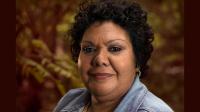For the first time an Indigenous woman has been appointed Aboriginal and Torres Strait Islander Social Justice Commissioner by the ultra-conservative Australian government. She is June Oscar, a proud Bunuba woman from troubled Fitzroy Crossing in Western Australia, who has devoted her career to improving the health and welfare of Indigenous people, particularly those living in remote areas. Professor Gillian Triggs, President of the Australian Human Rights Commission, wrote on its website that she is delighted by the appointment. The outspoken Prof. Triggs is a constant thorn in the side of the government, who have tried but failed to remove her from the post.
Triggs wrote: “Ms Oscar is well known for leading a successful campaign in the Kimberley region to restrict alcohol in a bid to curb fetal alcohol spectrum disorder as well as violence, crime, injury and death.” She starts her five-year tenure in the job on 3 April, replacing fellow Aborigine, Mick Gooda, who is now a Commissioner investigating the Northern Territory's youth justice system.
"I have known Ms Oscar for many years and have admired her passionate advocacy for Indigenous Australians," Indigenous Affairs Minister Nigel Scullion, a white man, commented on the tax-funded national broadcaster, ABC.
"Ms Oscar's appointment demonstrates the central role Indigenous women play in bringing about social change and I look forward to working closely with her in the future," Scullion, who is loathed by Aborigines, said.
Born in the northern Kimberley region of Western Australia, June Oscar has been a leading force on a range of social and economic causes for Australia's first people, noted the Sydney Morning Herald.
“For her entire adult life, June Oscar has believed the biggest change can come from the smallest acts. Her career has included pushing for restrictions on alcohol in remote communities, preservation of ancient languages and working to combat the scourge of fetal alcohol disorders.
“Researchers found that of 108 babies born in the region in 2002 and 2003, one-in-eight suffered from foetal alcohol spectrum disorder - among the highest rates in the world.
“Ms Oscar has advised a range of business, health and cultural organisations and was appointed to the Aboriginal and Torres Strait Islander Commission by the Hawke Labor government in 1990.
“She is the chief executive of the Marninwarntikura Women's Resource Centre in Fitzroy Crossing.
“She was Australian delegate to the United Nations Permanent Forum for Indigenous Issues in New York and was recognised as one of the 50 most influential women in the world in 2011, receiving an Order of Australia two years later.
“Ms Oscar won the prestigious Desmond
Tutu Reconciliation Fellowship last year, calling on Australians not to leave
reconciliation in the hands of others.
"Reconciliation is everyone's business," she said.
"We must reach beyond our worlds and interact with those who are not in our daily lives. In doing this we learn about the rich and complex histories of our nation and we also ascribe meaning to the lives of others."
The announcement comes amid moves by Prime Minister Malcolm Turnbull to reset relations with Indigenous Australia, with educator Chris Sarra recently appointed to lead the Prime Minister's Indigenous Advisory Council.
In the past decade Ms Oscar had earned an international reputation as a highly-effective advocate for children and women, wrote the nationally circulated “The Australian”, the flagship in the country of the global Rupert Murdoch media empire.
“In 2007 she successfully lobbied for a ban on full-strength takeaway alcohol in the West Australian pastoral town of Fitzroy Crossing, a community bedevilled by social ills, suicide, domestic violence and child neglect."

